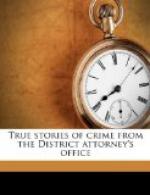A second time the detective had made a lucky hit, for Mrs. Parker suddenly laid aside all pretense and asked:
“Do you want to make a lot of money?”
Peabody allowed that he did.
“Do you know what they have got Jim for?” asked the girl.
“‘Phoney’ paper, wasn’t it?”
“Yes,” said Mrs. Parker, “but Jim didn’t write those checks. I wrote them myself. If you want to go in with me, we can earn enough money to get Jim out and you can do a good turn for yourself besides.”
The detective’s blood leaped in his veins but he held himself under control as well as he could and answered indifferently.
“I guess not. I never met a woman that was very good at that sort of game.”
“Oh, you don’t know me,” she persisted. “Why, I can copy anything in a few moments—really I can.”
“Too dangerous,” remarked Peabody. “I might get settled for ten years.”
“No, you wouldn’t,” she continued. “It’s the easiest thing in the world. All you have to do is to pick the mail out of some box on a corner. I can show you how with a copper wire and a little piece of wax—and you are sure to find among the letters somebody’s check in payment of a bill. There at once you have the bank, and the signature. Then all you have to do is to write a letter to the bank asking for a new check book, saying yours is used up, and sign the name that appears on the check. If you can fool the cashier into giving your messenger a check book you can gamble pretty safely on his paying a check signed with the same name. In that way, you see, you can get all the blank checks you need and test the cashier’s watchfulness at the same time. It’s too easy. The only thing you have to look out for is not to overdraw the account. Still, you find so many checks in the mail that you can usually choose somebody’s account that will stand the strain. Do you know, I have made hundreds of checks and the banks have certified every single one!”
Peabody laughed good naturedly. Things were looking up a bit.
“What do you think I am, anyhow?” he asked. “I must look like a ‘come-on.’”
“I’m giving it to you straight,” she said simply. “After you have made out a good fat check, then you go to a store, buy something, tell them to forward the check to the bank for certification, and that you’ll send for the goods and the change the next day. The bank always certifies the check, and you get the money.”
“Not always,” said Peabody with a grin.
“No, not always,” acquiesced Mrs. Parker. “But Jim and I have been averaging over a hundred dollars a day for months.”
“Good graft, all right,” assented the detective. “But how does the one who lays down the check identify himself? For instance, suppose I go into Tiffany’s and pick out a diamond, and say I’m Mr. John Smith, of 100 West One Hundredth Street, and the floorwalker says, ’Sorry, Mr. Smith, but we don’t know you,’ what then?”




